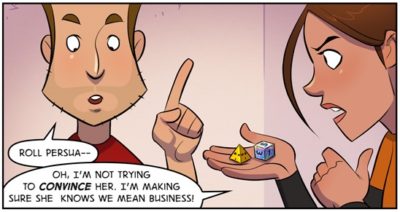 On this week’s page, Rotem asked for a roll that seems to have no, erm, point.
On this week’s page, Rotem asked for a roll that seems to have no, erm, point.
“I’m not trying to convince her,” says Rotem, “I’m making sure she knows we mean business!”
She than makes the roll (barely). Hurray! But what does it mean?
Technically, if you’ll check the rules, you’ll find the only game effect you can squeeze out of the Intimidate skill is a Test of Wills, which isn’t at all what’s going on here. This means Nadav and the group need to come up with their own interpretation for cases such as this.
The first question to ask, is:
What’s the difference between saying something in an intimidating way, and rolling for Intimidation?
Not every thing that is said intimidatingly calls for a roll – Mac and Heuberger obviously have bad blood between them, but neither of them rolled, despite even calling each other names. So only some intimidating things also require a roll. Which ones? In Nadav’s group, the answer is simple: when the GM says it’s required, because he wants to see if an NPC might change their worldview (see below), or when the player wants to make sure an NPC is perceiving her in a certain way.
In other words, Intimidation, along with the other social skills, are sometimes used to set a certain mood for further interactions. Rotem is now sure that Contessa perceives Muna’s team as a threat, not as a laughing stock, which might actually have been the case anyway, but now there’s no question about it. This isn’t to say that Contessa is driven to act in a certain way, just that she now sees the world differently then before – “Hmpf, Muna seems to mean business” – and that will inform Nadav when he decides on her actions.
This requires having answers to a second set of questions:
What’s to be gained from making the roll? What does a Raise, or a failure, mean?
Once everyone in the group decide together on answers to these questions (which happens naturally and with a silent agreement, in many groups), they become a sort of a rule, not that much different from the rules in the game’s book.
In Nadav’s group, a success makes sure that the NPC now incorporates this new attitude into her worldview. A Raise means she’s also actually frightened – becoming somewhat submissive, or perhaps more extreme, toward the PC. A failure means the NPC takes the words at face value – they have no emotional impact on her, so she still sees the PC as she saw them before.
Knowing these possible outcomes before asking for a roll really helps the players in building trust between them and the GM. This trust is crucial, because this “rule” isn’t in the rulebook, which makes it ethereal, possibly disregarded by the GM. The players must be reasonably sure that the GM will act in a way that befits this new fact that they’ve introduced into the story (they rolled for it, therefore it must influence the game!). They definitely should remind him, if he seems to forget.
I recommend making the answers to the questions given above as clear and known as possible, by removing the “silent” from silent agreement. If there’s nothing solid to be gained from a success, or lose from a failure, there’s no point for the roll in the first place. If the players don’t have even a vague idea of how their choice will influence the game, then it’s not really a choice.
The real power of rolling the dice is in giving the players the confidence that something real just happened, because the rules are real, not “just GM interpretation”.
That’s not to say that the game master must have different results ready. In fact, the NPC may behave in exactly the same way, whether or not a roll was made. This may sound contradictory to everything I just said, but it’s not – we’ll discuss this some other time, when we talk about the power of GM performance, which can be just as strong as the power of the dice.



